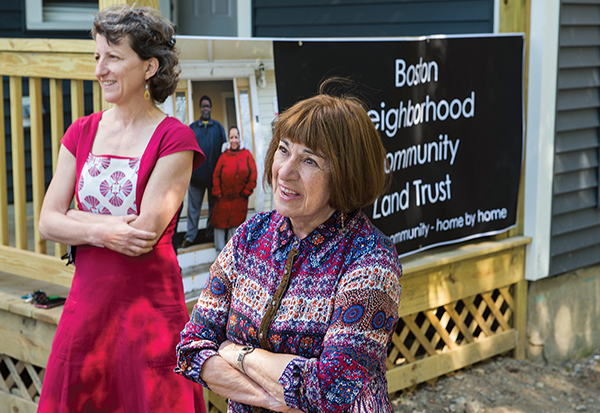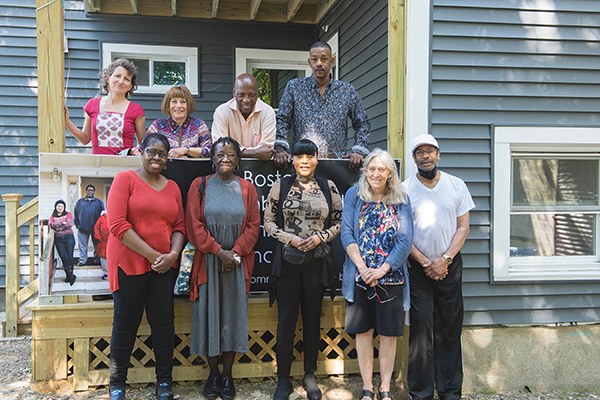The Last Mile to Home
A TBF Donor Helped Seal a Deal on Affordable Housing
TBF News Summer 2022
Three years ago, Anne Bromer joined the Boston Foundation’s community of donors by opening a Donor Advised Fund with the Foundation. “A good friend had recommended TBF,” she says. “In fact, she was on my case for a long time to get involved. Finally, I talked to my financial guy about it. He was happy to get rid of me!” she concludes with characteristic glee. In truth, he is still her “financial guy” but he was happy to transfer management of Bromer’s philanthropic giving to TBF since his organization’s systems were not expressly set up for that.
Bromer, who owns—and founded with her late husband David Bromer—Bromer Booksellers, brings a distinct energy and candor to everything she does. Boston is lucky in that much of that goes toward her philanthropic engagement. She and David both had longstanding interests in housing. Each had run for seats on the Watertown Housing Authority, and garnered so much community support during their campaigns that then Governor Michael Dukakis appointed David Bromer to a five-year term as chair of that Authority. Anne Bromer worked for the Mass Housing Finance Agency when it was new and the quasi-public organization was working to cut down the housing shortage, aiming for mixed income, scattered units that preserved local height ordinances. “If you can’t call someplace home, if you don’t have a safe place to go, how can you do anything else?” she asks.
She supported the grassroots community organization City Life/Vida Urbana and its anti-eviction efforts even before the pandemic. She loves the nonprofit’s grassroots approach. Wanting to engage with organizations that, beyond assisting folks with city agencies and courts and landlords, actually control the housing itself, City Life/Vida Urbana recommended the Boston Neighborhood Community Land Trust (BNCLT). Mentioning it to her TBF contacts, she was introduced to BNCLT’s first Executive Director. “The moment I met Meridith Levy, I knew: She’s the real thing!” Bromer says.
The feeling is mutual and the two rapidly developed a dynamic and productive relationship. “Conversations with Anne were super helpful,” says Levy, whose organization emphasizes purchasing occupied properties as a way to prevent displacement of families in response to foreclosure or during periods of high housing costs and gentrification. BNCLT considers both home ownership and acquisition of multifamily properties for renters as important and viable strategies to protect affordability, prevent foreclosure, and take properties off the speculative market. Community ownership, control and governance set CLT properties apart from traditional models of affordable housing. “I have a very small team, with everyone doing everything. We have an active Board—one-third resident, one-third community and one-third resources—that is technically the owner of the properties. But to have someone to be able to step back and talk things through with has been just invaluable.”
Their relationship was refined by fire during a particularly challenging but ultimately successful project. BNCLT was fighting to acquire 6 Humphreys Place, a six-unit building near Upham’s Corner. The landlord, despite doing little to maintain the residence, was intransigent around its sale. After countless negotiations and inspections and tenant organizing, Levy recounts, “even after finding issues with the property, he still wouldn’t budge and I thought the deal was collapsing.”
Bromer takes up the story: “I was so impressed with Meridith. There was nothing easy about this at all. But she would not let go of the bone. The landlord ran her through the mill, and we had one challenging tenant. I couldn’t give the whole cost of the building, but I worked my way up to $250,000 as a ‘last mile donation.’” In other words, if other sources could fundraise up to the total needed minus $250K, Bromer’s donation would kick in and get them over the line.
Levy says that the promise of that sum confirmed the City’s commitment to sign on through the Acquisition Opportunity Program. That’s a “soft grant,” by which the City provides an interest-free forgivable loan over a period of time as long as the affordability terms remain in place. Together, the City’s soft loan and the philanthropy supplement traditional loans—and reduce the risk to a point banks are willing to take for low-income housing. “We are facing a strong market alongside a housing crisis, and we would not be able to purchase these homes without subsidy,” explains Levy. “Philanthropy turns out to be an important part of the ‘capital stack.’ For donors the ROI is the mission and legacy of the organization; it is a social return. It’s the greatest gift possible, generating no interest due.”
The deal for 6 Humphreys Place was completed in December 2021. “I would do it again, for a bigger property with more units,” Bromer says. According to Levy, BNCLT is angling on several properties, including two on the same street. “We’re so small, we can’t go as fast as we’d like,” she says. Recently the Boston Foundation gave a Social Ecology Grant to form a network of community land trusts to help them share resources, join forces on policy campaigns and so on. “We’re at an inflection point,” muses Levy. “To make all this work we need to grow but also to function at the same time.”
Bromer brings her honesty to the point: “There’s never a good time to work on growth but you have to. You don’t want another whole year to go by without my giving money!”
Bromer, who owns—and founded with her late husband David Bromer—Bromer Booksellers, brings a distinct energy and candor to everything she does. Boston is lucky in that much of that goes toward her philanthropic engagement. She and David both had longstanding interests in housing. Each had run for seats on the Watertown Housing Authority, and garnered so much community support during their campaigns that then Governor Michael Dukakis appointed David Bromer to a five-year term as chair of that Authority. Anne Bromer worked for the Mass Housing Finance Agency when it was new and the quasi-public organization was working to cut down the housing shortage, aiming for mixed income, scattered units that preserved local height ordinances. “If you can’t call someplace home, if you don’t have a safe place to go, how can you do anything else?” she asks.
She supported the grassroots community organization City Life/Vida Urbana and its anti-eviction efforts even before the pandemic. She loves the nonprofit’s grassroots approach. Wanting to engage with organizations that, beyond assisting folks with city agencies and courts and landlords, actually control the housing itself, City Life/Vida Urbana recommended the Boston Neighborhood Community Land Trust (BNCLT). Mentioning it to her TBF contacts, she was introduced to BNCLT’s first Executive Director. “The moment I met Meridith Levy, I knew: She’s the real thing!” Bromer says.
The feeling is mutual and the two rapidly developed a dynamic and productive relationship. “Conversations with Anne were super helpful,” says Levy, whose organization emphasizes purchasing occupied properties as a way to prevent displacement of families in response to foreclosure or during periods of high housing costs and gentrification. BNCLT considers both home ownership and acquisition of multifamily properties for renters as important and viable strategies to protect affordability, prevent foreclosure, and take properties off the speculative market. Community ownership, control and governance set CLT properties apart from traditional models of affordable housing. “I have a very small team, with everyone doing everything. We have an active Board—one-third resident, one-third community and one-third resources—that is technically the owner of the properties. But to have someone to be able to step back and talk things through with has been just invaluable.”
Their relationship was refined by fire during a particularly challenging but ultimately successful project. BNCLT was fighting to acquire 6 Humphreys Place, a six-unit building near Upham’s Corner. The landlord, despite doing little to maintain the residence, was intransigent around its sale. After countless negotiations and inspections and tenant organizing, Levy recounts, “even after finding issues with the property, he still wouldn’t budge and I thought the deal was collapsing.”
Bromer takes up the story: “I was so impressed with Meridith. There was nothing easy about this at all. But she would not let go of the bone. The landlord ran her through the mill, and we had one challenging tenant. I couldn’t give the whole cost of the building, but I worked my way up to $250,000 as a ‘last mile donation.’” In other words, if other sources could fundraise up to the total needed minus $250K, Bromer’s donation would kick in and get them over the line.
Levy says that the promise of that sum confirmed the City’s commitment to sign on through the Acquisition Opportunity Program. That’s a “soft grant,” by which the City provides an interest-free forgivable loan over a period of time as long as the affordability terms remain in place. Together, the City’s soft loan and the philanthropy supplement traditional loans—and reduce the risk to a point banks are willing to take for low-income housing. “We are facing a strong market alongside a housing crisis, and we would not be able to purchase these homes without subsidy,” explains Levy. “Philanthropy turns out to be an important part of the ‘capital stack.’ For donors the ROI is the mission and legacy of the organization; it is a social return. It’s the greatest gift possible, generating no interest due.”
The deal for 6 Humphreys Place was completed in December 2021. “I would do it again, for a bigger property with more units,” Bromer says. According to Levy, BNCLT is angling on several properties, including two on the same street. “We’re so small, we can’t go as fast as we’d like,” she says. Recently the Boston Foundation gave a Social Ecology Grant to form a network of community land trusts to help them share resources, join forces on policy campaigns and so on. “We’re at an inflection point,” muses Levy. “To make all this work we need to grow but also to function at the same time.”
Bromer brings her honesty to the point: “There’s never a good time to work on growth but you have to. You don’t want another whole year to go by without my giving money!”


